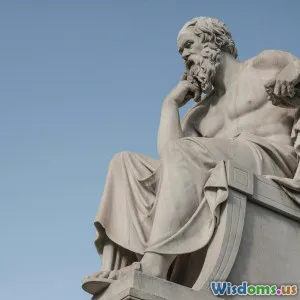
Bridging Science and Spirituality: A Philosophical View
5 min read Explore the intersection of science and spirituality, examining philosophical insights that unite these two seemingly disparate realms. (0 Reviews)
Bridging Science and Spirituality: A Philosophical View
In a world where scientific discoveries often seem to contradict spiritual beliefs, the quest to find common ground has never been more pressing. This article explores the philosophical nuances that allow science and spirituality to coexist, offering fresh insights into the nature of existence and the human experience.
Understanding Science and Spirituality
The Scientific Perspective
Science is often perceived as a systematic study of the natural world, relying on empirical evidence and logical reasoning. It seeks to understand the mechanics of the universe through experimentation and observation, providing us with technological advancements and a deeper understanding of the laws that govern our reality. From quantum physics to neuroscience, science seeks to unravel the complexities of existence.
The Spiritual Perspective
Conversely, spirituality encompasses a broader range of beliefs and practices that connect individuals to something greater than themselves. It often involves a search for meaning, purpose, and transcendence. Spirituality can take many forms, including religion, meditation, and personal introspection, focusing on inner experiences and the exploration of consciousness.
The Philosophical Bridge
Philosophy acts as the bridge between these two domains, allowing for a dialogue that recognizes the strengths and limitations of both perspectives. Here are some key philosophical concepts that facilitate this conversation:
1. The Nature of Reality
Philosophers like Immanuel Kant and David Hume have long debated the nature of reality, questioning whether our perceptions truly reflect the world. This inquiry resonates with both scientific inquiry and spiritual exploration. While science seeks measurable truths, spirituality often embraces subjective experiences, suggesting that both may offer parts of a unified understanding of reality.
2. Consciousness and Existence
Consciousness remains one of the most profound mysteries in both science and spirituality. Neuroscience has made significant strides in understanding how the brain functions, yet questions about the nature of consciousness persist. Philosophers such as René Descartes posited that consciousness is tied to existence, with the famous phrase "Cogito, ergo sum" — "I think, therefore I am". Spiritual traditions often assert that consciousness exists beyond the physical realm, suggesting a deeper connection to the universe.
3. The Interconnectedness of All Things
Many spiritual philosophies emphasize the idea of interconnectedness, where all beings are seen as part of a larger whole. This concept resonates with scientific discoveries in fields like ecology and quantum physics, where systems and particles are understood to be interrelated. Philosophers like Alfred North Whitehead and more contemporary thinkers argue that reality is not a collection of isolated entities but a web of relationships, further bridging the gap between science and spirituality.
Practical Applications
Integrating Science and Spirituality in Daily Life
- Mindfulness and Meditation: Practices rooted in spirituality, such as mindfulness and meditation, have been shown to have positive effects on mental health, supported by scientific research.
- Holistic Health: The integration of spiritual practices into healthcare, such as considering patients' emotional and spiritual well-being, can enhance healing and healthcare outcomes.
- Environmental Ethics: Understanding our interconnectedness encourages a more sustainable approach to living, reflecting both scientific and spiritual commitments to preserving the planet.
Conclusion
The dialogue between science and spirituality is rich with potential insights, offering a more comprehensive understanding of ourselves and the universe. By embracing the philosophical underpinnings that connect these realms, we can foster a more holistic view of existence, one that values empirical evidence while also honoring subjective experiences. As we navigate our lives, bridging science and spirituality can lead to greater awareness, compassion, and a deeper appreciation for the mysteries of life.
Rate the Post
User Reviews
Popular Posts





















